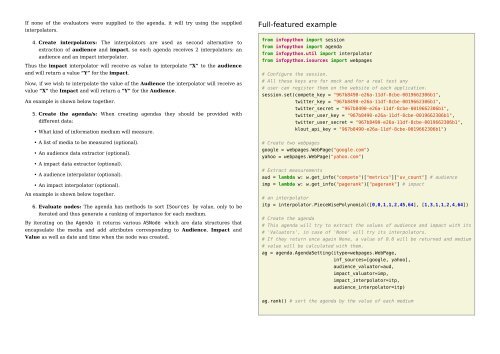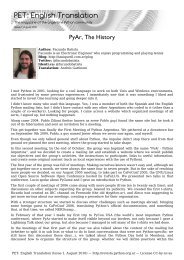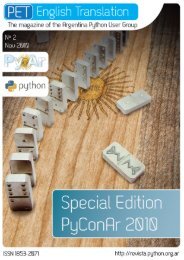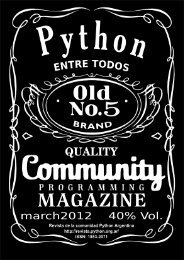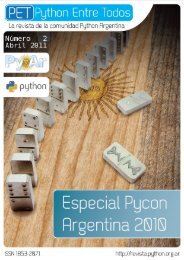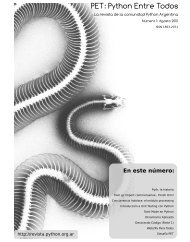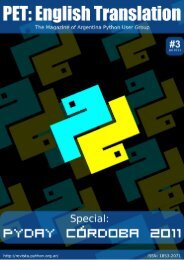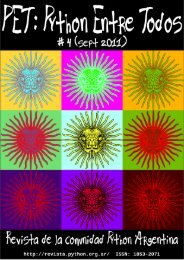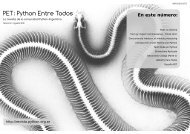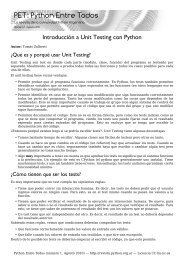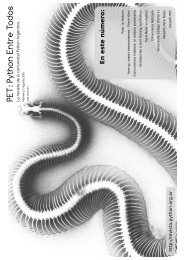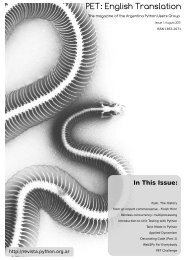color version - PET: Python Entre Todos - Python Argentina
color version - PET: Python Entre Todos - Python Argentina
color version - PET: Python Entre Todos - Python Argentina
Create successful ePaper yourself
Turn your PDF publications into a flip-book with our unique Google optimized e-Paper software.
If none of the evaluators were supplied to the agenda, it will try using the supplied<br />
interpolators.<br />
4. Create interpolators: The interpolators are used as second alternative to<br />
extraction of audience and impact, so each agenda receives 2 interpolators: an<br />
audience and an impact interpolator.<br />
Thus the impact interpolator will receive as value to interpolate “X” to the audience<br />
and will return a value “Y” for the impact.<br />
Now, if we wish to interpolate the value of the Audience the interpolator will receive as<br />
value “X” the Impact and will return a “Y” for the Audience.<br />
An example is shown below together.<br />
5. Create the agenda/s: When creating agendas they should be provided with<br />
different data:<br />
• What kind of information medium will measure.<br />
• A list of media to be measured (optional).<br />
• An audience data extractor (optional).<br />
• A impact data extractor (optional).<br />
• A audience interpolator (optional).<br />
• An impact interpolator (optional).<br />
An example is shown below together.<br />
6. Evaluate nodes: The agenda has methods to sort ISources by value, only to be<br />
iterated and thus generate a ranking of importance for each medium.<br />
By iterating on the Agenda it returns various ASNode which are data structures that<br />
encapsulate the media and add attributes corresponding to Audience, Impact and<br />
Value as well as date and time when the node was created.<br />
Full-featured example<br />
from infopython import session<br />
from infopython import agenda<br />
from infopython.util import interpolator<br />
from infopython.isources import webpages<br />
# Configure the session.<br />
# All these keys are for mock and for a real test any<br />
# user can register them on the website of each application.<br />
session.set(compete_key = "967b8490-e26a-11df-8cbe-0019662306b1",<br />
twitter_key = "967b8490-e26a-11df-8cbe-0019662306b1",<br />
twitter_secret = "967b8490-e26a-11df-8cbe-0019662306b1",<br />
twitter_user_key = "967b8490-e26a-11df-8cbe-0019662306b1",<br />
twitter_user_secret = "967b8490-e26a-11df-8cbe-0019662306b1",<br />
klout_api_key = "967b8490-e26a-11df-8cbe-0019662306b1")<br />
# Create two webpages<br />
google = webpages.WebPage("google.com")<br />
yahoo = webpages.WebPage("yahoo.com")<br />
# Extract measurements<br />
aud = lambda w: w.get_info("compete")["metrics"]["uv_count"] # audience<br />
imp = lambda w: w.get_info("pagerank")["pagerank"] # impact<br />
# an interpolator<br />
itp = interpolator.PieceWisePolynomial([0,0,1,1,2,45,64], [1,3,1,1,2,4,64])<br />
# Create the agenda<br />
# This agenda will try to extract the values of audience and impact with its<br />
# 'Valuators', in case of 'None' will try its interpolators.<br />
# If they return once again None, a value of 0.0 will be returned and medium<br />
# value will be calculated with them.<br />
ag = agenda.AgendaSetting(itype=webpages.WebPage,<br />
inf_sources=[google, yahoo],<br />
audience_valuator=aud,<br />
impact_valuator=imp,<br />
impact_interpolator=itp,<br />
audience_interpolator=itp)<br />
ag.rank() # sort the agenda by the value of each medium


